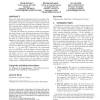227 search results - page 23 / 46 » Combinatorial Auctions with Budgets |
109
Voted
SIGECOM
2008
ACM
15 years 12 days ago
2008
ACM
We provide tight information-theoretic lower bounds for the welfare maximization problem in combinatorial auctions. In this problem, the goal is to partition m items among k bidde...
116
Voted
CORR
2002
Springer
15 years 9 days ago
2002
Springer
Combinatorial auctions where agents can bid on bundles of items are desirable because they allow the agents to express complementarity and substitutability between the items. Howe...
88
Voted
ATAL
2009
Springer
15 years 7 months ago
2009
Springer
A combinatorial auction mechanism consists of an allocation rule that defines the allocation of goods for each agent, and a payment rule that defines the payment of each winner....
161
Voted
Publication
Global logistics flows have increased dramatically in recent years due to the globalization in the world economy. It is more complex than the domestic logistics, consisting of mult...
115
click to vote
JIFS
2007
15 years 11 days ago
2007
We present a solution to the winner determination problem which takes into account not only costs but also risk aversion of the agent that accepts the bids, and which works for au...

